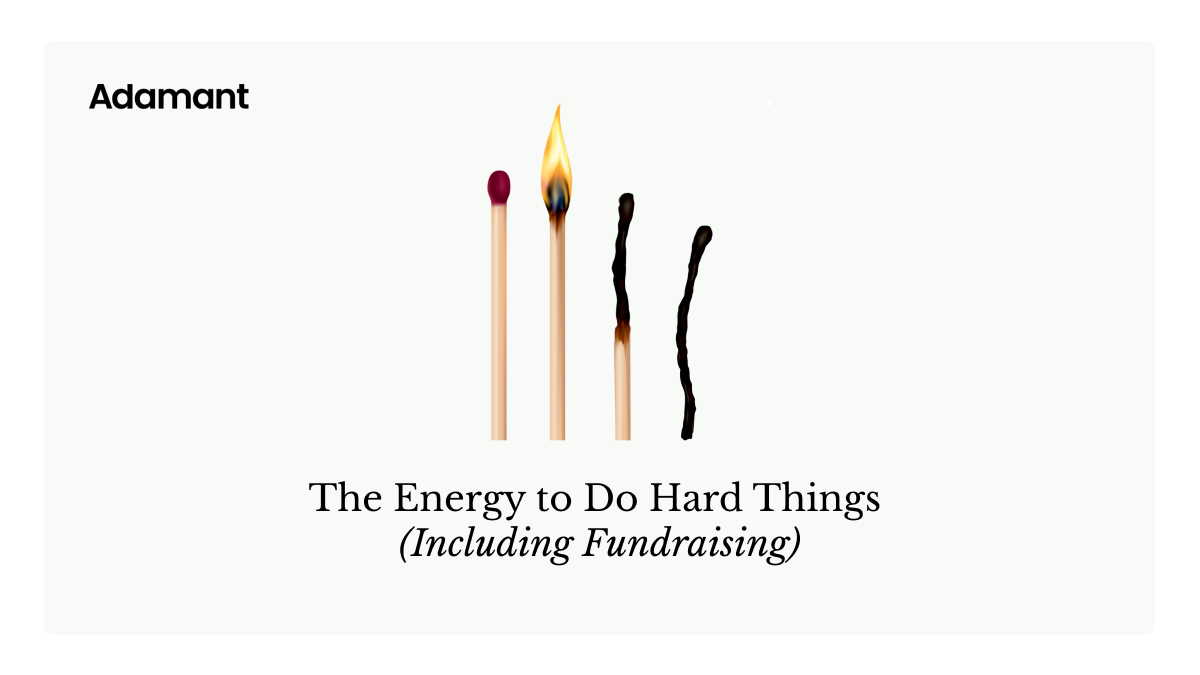The Energy to Do Hard Things (including fundraising)

From age five, when I started piano lessons, all the way to about three months ago, when I was running a five-person services company, I’ve pushed really hard.

Pushing hard has led to some great things, but not always. I think it’s worth sharing some lessons from reflecting on this.
Here are some thoughts from a period of downshifting and rest — mostly about what it takes to do hard things and how keeping your energy up matters. Especially for my readers who are thinking about doing something really hard (raising money).
A Quick Recap of the Stuff I’ve Pushed Hard For in My Life:
- Learning to play instruments
- Practicing sports / Working out
- Getting top grades
- Applying to universities
- Interviewing for fancy jobs
- Studying for the SATs / GMATs
- Launching companies
- Raising capital
- Selling companies
- Starting bootstrap businesses
- Hiring people
- Personal development (working on myself)
- My LinkedIn (in case you’re curious)
Every one of them was hard in its own way.
It wasn’t until recently that I realized I’d been using what Cal Newport calls the “any benefit” mindset. In other words, if something had any measurable value or external validation, I’d justify working hard at it. In case it’s unclear… that’s not a good framework to use.
What the “any benefit” approach doesn’t account for is whether I actually want to do the thing. Whether it’s meaningful to me. And it certainly doesn’t take into account the costs and the downsides of any of my choices…
Hitting Pause, Downshifting
About three months ago, I let a few team members go so I could right-size my business and give myself some breathing room. I reworked my day-to-day to fit what I wanted to do first before thinking about efficiency or growth or impact or any other typical metric that I applied for the past 25 years.
Then I started a few side projects just for fun (check out Capital Interests!) and took a two-week surf trip (a “business trip” for Capital Interests haha).

Somewhere in that window, I got the best sleep I’ve had in years. I even started lucid dreaming again, something I hadn’t done in forever.
And yeah, if you’re reading this, you probably noticed the newsletter took an unannounced break. That wasn’t planned. I just had other stuff on my mind…Thanks for understanding and being cool with the pause.
Part of this rebalancing has brought me back to the things I actually do want to spend energy on. There are things that I had been doing at Adamant that didn’t make the cut, but the cool thing is writing this newsletter wasn’t one of them. It turns out I really like teaching and sharing things I’ve learned. Thinking through messy problems and helping others solve similar problems is fulfilling. Sending this newsletter out to you all gives me that opportunity so I’m back at it! It’ll probably be on a less consistent schedule, but I think you’ll see more quality and essays with more soul. Overall just stuff that’s more in tune with what feels worth putting out.
Fundraising When You’re Running on Empty
Don’t worry, this is not a pivot to a personal development, mental health newsletter. I’m happy to bring this back to the topic ya’ll are here to read about. So how does this relate to fundraising?
Two things I think founders need to hear before heading into a fundraise. Both relate to what i just wrote about:
- Fundraising is hard. Like, actually hard. It takes a TON of time, focus, energy, and resilience. Emphasis on “ENERGY”
- If you start that process with an empty tank, you’re probably not going to do it well.
Now, I’m not saying you need to disappear for a year and sit on a beach with a journal before going to fundraise. Amazing if you could, but likely not doable.
What i’m telling you is if you’re already feeling burned out before going out to raise, find some space for yourself…even a small bit. A long weekend. A short trip. A few days with no calendar. Whatever it takes to feel like you’re not crawling into the fundraise half-alive.
Too many founders string everything together without taking a second to breathe. Starting the company, pushing the launch, landing the customers, putting out the fires…. and then straight into raising capital! It’s not a good thing!
Take a step back. Delaying your kickoff by a few days won’t be the reason your fundraise fails…but NOT taking that time COULD be 😳.
Guide / Quick Gut Check ☑: Do you need to fill up before fundraising?
Check this list. If a few of these are a yes… look for ways to recharge
- Someone offers you five warm intros for your fundraise next week — you feel a pit in your stomach, not excitement
- You’re avoiding your inbox or slack even when it’s not that full
- You’ve got low-key dread around tasks that used to be easy
- Your sleep is off or you wake up tired
- Everyone on your team is kind of annoying right now, even though they haven’t changed
- You keep saying “I just need to get through this week”… every week
So if even a few of these are a yes… don’t swallow the feeling and “power through”. Follow the next guide.
⏸️ How to actually reset (even with just a long weekend)
Instead of leaving you with a vague “go reset with a long weekend”…here’s a simple process to actually take a 3-4 days off:
- Pick the days and block your calendar — no calls, no “quick syncs,” no check-ins. Actually block the days off with nothing work related.
- Plan how you’ll get extra work done ahead of the time off — it won’t be successful if you don’t do extra work before your time off. You’ll just stress out about slipping.
- Tell your team in advance and assign responsibilities — for you to fully unplug, you’ll need help. You need to trust there are people taking care of things and there are processes in place to cover “emergencies”. Without that peace of mind, you’ll just keep checking your messages.
- Tell your family / friends in advance - this needs to be alone time and you need your friends and family to know you won’t be super responsive.
- Physically change locations and get access to nature — even a friend’s place or Airbnb can work. As long as it’s not your home (too easy to fall into old habits) and that you can find a way to get outside in nature, it’ll work.
- Remove social media and messaging apps from your phone — it’s only a few days but this unplug has to be as severe as you can make it. That means no IG/Tiktok, no Twitter, no Linkedin, no email, and no Slack. This can absolutely be done with away messages and if you must, a plan to check messages from your computer at the end of the day. Better if you take a couple days completely away, but I understand if you need an end of day check-in.
- Plan to eat well but healthy — you want to enjoy your fuel over the weekend and feel good after.
- Sleep more than you think you need — aim for 9 hours, not 6.5
- Plan your days around 2 to 3 meditative, not distracting activities away from screens — That means hikes, outdoor activities where you can enjoy nature (surf, bike ride), yoga, cooking, crafting, and light fictional reading. And don’t over plan. Some boredom is ok - that’s when your brain starts resetting!
- For the physical activities, move your body without optimizing it — walk, surf, stretch… whatever feels easy.
- If journaling is something you’e done, write down your experience — for those of you who have experience journaling. Journal. If you haven’t, just think about writing down what you did during the day and what you thought about or felt. No work count goals or anything like that. Just a chance to dump out your mind.
This isn’t about feeling productive. It’s about giving your mind a second to stop white-knuckling everything.
Last Thought: You Have to Want to Fundraise
After your recharge, there’s one last thing I want to underline: fundraising is not something you should do unless you really want what comes with running a venture-backed company.
Yes, you can fake it. You can study the psychology of pitching, rehearse the script, and tell a story that works. You might even close the round (especially if you’re a loyal reader 😘😘 ). But if your heart isn’t actually in it, being in charged of a venture-backed company is probably one of the worst outcomes.
Taking money from others means signing up for a long, hard project — — one where you now owe results to more than just yourself.
So before you raise, stop and ask: do I actually want this path? Not just “do I think this would look good” or “would this make my peers, my parents, my etc. proud.” Ask yourself if you really understand the trade-offs / downsides and whether those are things you’re willing to live with.
Too many people raise for the perceived benefit. The status. The validation. The idea that it’s the “next step.” But if it’s not what you want, the cost might be way higher than it looks at the start.
That’s It for Now
More essays coming, but probably less frequent, more personal. I’ll write when I feel like I have something worth saying — or when I come across someone whose thinking I think more people should hear.
Thanks for reading. Go get some rest.
(and of course) Be chased,
Jason


.png)
.jpg)